Bloy House News
The Episcopal Theological School at Claremont
|
Greetings from Bloy House, the Episcopal Theological School at Claremont, where another class has graduated and we're looking forward to the fall term. Thank you for considering Bloy House/ETSC for theological coursework and continuing education alike. For information, phone 909.621.2419 or email bloyhouse@cst.edu.Faithfully in Christ,
(The Very Rev.) Sylvia Sweeney, Ph.D.
Bloy House Dean and President
|
|
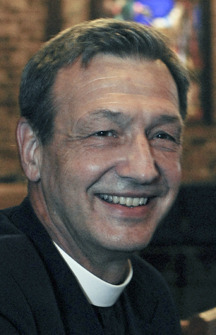 Bloy House celebrates two Bloy House celebrates two
new partnerships this Fall
This fall Bloy House will recognize and celebrate two important new partnerships. On September 27, 2014 President Mark Richardson (pictured at left) and Academic Dean Ruth Meyers (below left) will visit Bloy House for the official signing of the new Memorandum of Understanding between Bloy House and Church Divinity School of the Pacific. As some of you are aware, Bloy House's early history stretches back to a time when CDSP was instrumental 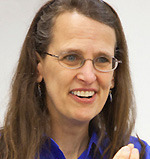 in the founding of Bloy House to provide a setting for Episcopal theological formation here in Southern California. The first Bloy House classes were taught by members of the CDSP faculty. As both schools grew, time demands did not allow for a continuation of that original agreement, but over the decades there has been wonderful partnership between the two schools. Now there is an official document to recognize that relationship. Students wishing to receive their master of divinity degrees from CDSP will complete two-thirds of their program here at Bloy House and then complete the final third of their program through summer and January intensives on the CDSP campus in Berkeley and online learning done in CDSP classes. This relationship will be almost identical to our current partnership with Episcopal Divinity School in Cambridge, Massachusetts. in the founding of Bloy House to provide a setting for Episcopal theological formation here in Southern California. The first Bloy House classes were taught by members of the CDSP faculty. As both schools grew, time demands did not allow for a continuation of that original agreement, but over the decades there has been wonderful partnership between the two schools. Now there is an official document to recognize that relationship. Students wishing to receive their master of divinity degrees from CDSP will complete two-thirds of their program here at Bloy House and then complete the final third of their program through summer and January intensives on the CDSP campus in Berkeley and online learning done in CDSP classes. This relationship will be almost identical to our current partnership with Episcopal Divinity School in Cambridge, Massachusetts.
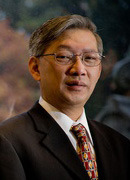 We are also delighted to announce that November 15 there will be another celebration to mark the new formal relationship between Claremont School of Theology and Bloy House. This partnership will share many of the same parameters as our other two partnerships and once again provide our seminarians with a Southern California option for receiving their master of divinity degrees. The relationship between Bloy House and CST has been an important ecumenical partnership since 1969, and we are delighted to enter this new stage in our relationship. President Jeffrey Kuan (pictured above left) will be with us as preacher to mark this important occasion. We are also delighted to announce that November 15 there will be another celebration to mark the new formal relationship between Claremont School of Theology and Bloy House. This partnership will share many of the same parameters as our other two partnerships and once again provide our seminarians with a Southern California option for receiving their master of divinity degrees. The relationship between Bloy House and CST has been an important ecumenical partnership since 1969, and we are delighted to enter this new stage in our relationship. President Jeffrey Kuan (pictured above left) will be with us as preacher to mark this important occasion.
In all three of our partnerships, students complete 48 hours of course work at Bloy House and then complete 24 hours, including a local field education placement, through the partner school. This arrangement allows all those seeking an M.Div. to receive their degrees from an accredited seminary while doing the largest part of their course work through our Bloy House model of ministerial formation.
|
|
Welcome, new students!
On August 16 the incoming class of Bloy House seminarians will gather for new-student orientation. We welcome these students and ask you to keep them in your prayers as they begin this exciting and challenging new experience in their ministry formation. Entering students are Pippi Currey of St. Mark's, Altadena, Richard Sinacola, Matt O'Connor of St. James,' South Pasadena, Celeste Stump of St. Mark's, Upland, Vivian Hay of St. Alban's, Westwood, Betty Creamer of St. Anthony of the Desert, Desert Hot Springs, Cari Anderson of St. Timothy's, Apple Valley, and Robert Pierson of Mt. Calvary Monastery, Santa Barbara. In addition to these new students ,we are happy to welcome a number of returning Education for Episcopal Leadership students who will be taking part in that program this fall. Together they bring a wealth of experience and wisdom to our life at Bloy House, and we are so grateful to have them all in our midst.
Registration closes soon for Fall Education
for Episcopal Leadership classes
Those students still contemplating enrolling in our Education for Episcopal Leadership track and taking classes on a not-for-credit basis for their own lay ministerial formation or clergy continuing education are encouraged to contact the Bloy House office immediately to make application. Classes begin on August 22, and any student seeking to be enrolled in classes will need to have finished the admissions process by that time. For details on which classes are being taught this fall semester, please go to the Bloy House website and click on the June 2014 Bloy House News (or click here). Cost of EEL classes is $400 and $100 scholarships are available for those with financial need. 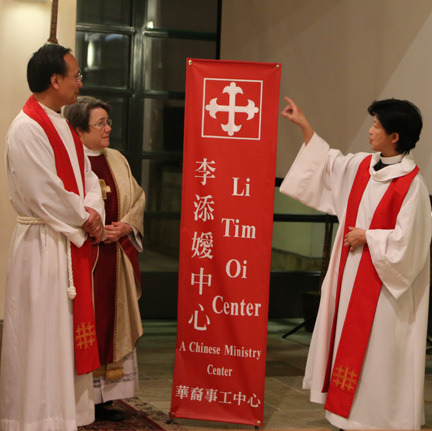 Bloy House partners with new Li Tim-Oi Center Bloy House partners with new Li Tim-Oi Center
The Li Tim-Oi Center is a ministry at Church of Our Saviour, San Gabriel, that provides ministry formation resources for Asian American clergy and lay leaders. In spring of this year Bloy House had the opportunity to offer support to the center and the Chinese Convocation of the Episcopal Church by leading a workshop on lay preaching. This fall we hope to continue that partnership by providing support to faculty members of the Li Tim-Oi Center as they develop new course work for equipping lay leaders in the Diocese of Los Angeles. The Center will offer classes on a model parallel to the ministry being done by the Instituto de Liderazgo with Latino congregations in the diocese. Pictured above are the executive director of the center, the Rev. Dr. Thomas Ni; Bishop Suffragan Diane Jardine Bruce, Bloy House alumna; and the Rev. Ada Wong-Nagata, another Bloy House alumna who serves as director of community relations and as a faculty member of the center.
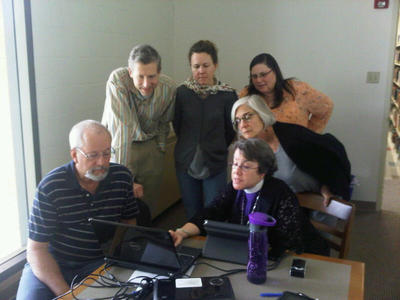 Media and Ministry class to be offered this Fall Media and Ministry class to be offered this Fall
What is the most important evangelism tool that congregations currently have at their disposal? Without a doubt it is the internet and forms of social media. Through these resources it becomes possible for congregations and dioceses to move out of their largely locked up tight buildings into the greater world. In a day and age when we are finding it more and more difficult to leave our physical door open 24 hours a day around the clock, the internet has made it possible for us to do precisely that. We can create words of comfort and encouragement, offer emergency access to pastoral care, teach people about the church, and welcome newcomers into our life together with just a few clicks of a few buttons. The possibilities for ministry through these tools are staggering, and yet so few Episcopal churches across the country are coming anywhere near close to maximizing the potential of this invaluable and inexpensive resource.
Why? For the most part, because we do not have communication leaders with adequate time, training, and passion to produce the content.
"Media and Ministry" is a cutting edge class offered by Bloy House that allows lay persons and priests seeking to more fully reach out to the world to learn the basic skills they need to be able to do so. Making use of social media requires a combination of technical smarts and communication savvy that does not necessarily come naturally to many of our congregational leaders. Even those who are experts at using social media for their own private purposes, are not necessarily as skilled in crafting compelling and theologically sound messages for a world full of spiritual seekers.
"Media and Ministry" is a semester-long Bloy House class designed to teach exactly these skills. Classes are held on Saturdays and are taught by Bob Williams, canon for community relations of the Diocese of Los Angeles and a former communication director at the Episcopal Church Center in New York. Cost of the class for those who do not need to receive credit is $400 and there is scholarship help available for those with financial need. To learn more or to register, call 909.621.2419 or email to info@bloyhouse.org. Occasionally we have also been able to offer an abbreviated one-day version of this class in different parts of the diocese. If your deanery would be interested in hosting such an event, please contact the dean to explore this option.
|
|
Fresh Start for Lay Leaders
It's one of the best kept secrets in the diocese. We all know that the world is changing and the church must change with it. Clergy, faced with the never-ending barrage of statistics about lower attendance at church, in traditional Sunday School programs, and the huge challenges currently facing any congregation trying to maintain a teen youth group, are especially conscious of the many ways in which what has worked in the past is not necessarily what will keep working in the future. Often clergy try and make inroads creating new paradigms for their faith communities, new understandings of what it means to be the Episcopal Church in our particular geographical and demographic contexts in this 21st century world. Sometimes those attempts to change a congregation's culture and perspective are met with success and at other times skepticism, grief, and fear -- particularly when clergy are trying to go it alone and be the one voice in a community calling for substantive change. But what if there were a partnership between clergy and highly respected lay leaders? What if there were voices speaking in stereo or surround sound to this community, not just the lone voice of the rector or vicar? Might things go differently? Might it be easier for communities to transform themselves and take on new missional life if active lay leaders were also leading that call for renewal and rebirth?
Fresh Start for Lay Leaders was designed with just such a vision in mind. Originally it was focused primarily on helping lay leaders understand important church dynamics at play in the midst of major congregational transitions, but we've now come to realize that in this fast-paced 21st century world, all congregations are constantly in periods of transition of one kind or another. Fresh Start for lay leaders provides a setting in which lay leaders of congregations can gain knowledge in the area of congregational development and church leadership. It offers key lay leaders in congregations the opportunity to explore the dynamics of church growth, of adaptive change, of long and short range planning, and the changing landscape of 21st century Christianity. Fresh Start for Lay Leaders provides information on systems and how they function, evolve, adapt, grow, and sometimes die. It is an excellent setting for allowing lay leaders to meet with other lay leaders from across the diocese and learn that the issues, problems, challenges, and joys they face are often similar to what is being addressed by other congregations in the larger church and in the diocese. Fresh Start for Lay Leaders is a place for reflection, for learning, and for empowerment. Fresh Start leaders find their voice, claim their baptismal authority, and learn what it means to work in partnership with their community's clergy leaders.
This is a semester-long program that meets at Bloy House on Bloy House teaching weekends. Participants also have the opportunity to participate in the worship services and community life of Bloy House as a part of this excellent leadership formation experience. If you think you or a member of your congregation might benefit from being a part of this wonderful group of leaders, contact Canon Joanna Satorius (at 213.482.2040 or jsatorius@ladiocese.org) or the Bloy House office to learn more.
|
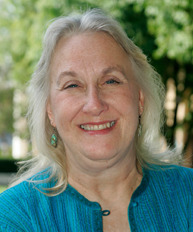 Anglican and Episcopal History Journal includes article by Dean Sweeney, editing by Prof. Anglican and Episcopal History Journal includes article by Dean Sweeney, editing by Prof.
Kujawa-Holbrook
The summer issue of Anglican and Episcopal History Journal commemorates the fortieth anniversary of the ordination of women. Edited by Dr. Sheryl Kujawa-Holbrook (pictured above), professor of Anglicanism and Religious Education at Bloy House and dean of Claremont School of Theology, the issue includes articles by Bishop Barbara Harris, Dr. Carter Heyward and the Rev. Renee McKenzie, vicar of the historic Church of the Advocate where the first ordinations of women in the Episcopal Church took place in 1974. Dean Sweeney contributed the article "The Feminization of the Episcopal Priesthood: Changing Models of Church Leadership," which explores the ways in which ministerial formation is being reformed and reshaped as a result of the presence of women in ordained leadership roles within the Episcopal Church.'40Firsts' series highlights
roles of ordained women
A 40-part series of articles on women who were the first in particular areas of ordained ministry was launched this summer on Facebook in a collaborative effort of Episcopal Commons, a new digital platform created by Bloy House media instructor Bob Williams. The "40Firsts" series includes profiles of the Philadelphia 11 ordinands, five of whom gathered for a commemorative symposium and Eucharist hosted on July 26 by the Diocese of Pennsylvania. The series also includes profiles on a sampling of women who were the first to be ordained to the priesthood in various dioceses, including Bloy House Dean Sylvia Sweeney, who was the first woman to be priested in the Diocese of Florida. The series has been shaped with invaluable input from Dr. Fredrica Harris Thompsett of EDS and author Darlene O'Dell, whose new book The Story of the Philadelphia Eleven was released earlier this year by Seabury Books. Meanwhile, Thompsett is editor of the new book Looking Forward, Looking Back: Forty Years of Women's Ordination, released by Church Publishing Incorporated. The Episcopal Commons platform will take up additional topics later this year with input from various members of the Bloy House community.
|
 Bloy House grad writes Bloy House grad writes
White House novel In time for the 40th anniversary of Richard Nixon's resignation, a 2003 Bloy House graduate who worked for Nixon has published a novel, Jackson Place, in which a fictional 37th president chooses to undergo a Senate impeachment trial instead of quitting.
The author is John H. Taylor, vicar of St. John Chrysostom Episcopal Church and School in Rancho Santa Margarita. He served on former President Nixon's staff from 1979-90 and was director of the Nixon Library in Yorba Linda from 1990 until, under Taylor's leadership, it became part of the federal system of presidential libraries in 2007.
Born in Detroit to newspapering parents, John seemed destined for a career in journalism until former President Nixon hired him in 1979. He became Mr. Nixon's chief of staff in 1984, traveling with him to the Soviet Union, China, and many other countries, helping with six of his books, and overseeing plans for the Nixon Library. President Nixon's confidante and biographer, Jonathan Aitken, wrote that Mr. Nixon's association with John was "the best relationship he had enjoyed with an aide since his White House days with Henry Kissinger."
Named library director in 1990, John oversaw President and Mrs. Nixon's funerals in 1994 and 1993. He helped launch the Nixon Center in Washington, now the Center for the National Interest, in 1994. Chosen by President Nixon as one of two executors of his estate, John helped pave the way for the opening of the Nixon White House tapes and other historical materials. In 2007, he coordinated the privately-run Nixon Library's entry into the federal government's system of presidential libraries, recommending to the archivist of the U.S. the appointment of the library's first federal director, Timothy Naftali.
John began his seminary education in 1998 and was ordained an Episcopal priest in January 2004. He has been vicar of St. John's Church and School since October 2004.
John has written two novels, Patterns Of Abuse (1988) and Jackson Place (2014), and many articles for newspapers and magazines. He is married to Kathy O'Connor, Mr. Nixon's last chief of staff, and is the father of two and the stepfather of two more.
"Mr. Nixon was fond of historical 'what-ifs?,' as are many scholars," John said. "So I imagined a 25-year-old White House lawyer whose rabbi inspires her to talk him out of resigning. I got the idea almost 25 years ago but didn't get around to starting it until last August, during a week of chaplaincy at Camp Stevens. It was the clear mountain air and contemplative atmosphere that finally did it."
Jackson Place is available at Amazon.com as a trade paperback and an e-book.
|
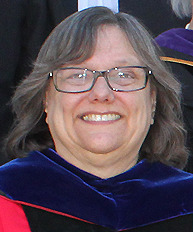 Eschewing hubris,
encouraging success
By Sylvia Sweeney
I've been thinking a lot about hubris lately. Hubris, that form of excessive pride or excessive ambition or haughtiness that inevitably leads to one's own undoing. Hubris is, it seems to me, almost always an outgrowth of initial success at something. What we do with that success, however, is take it as entitlement rather than the gift dropped from the skies it almost always is. Pride is a sign of maturity, an owning and claiming of one's self and one's gifts. But hubris, it seems, is most often a disowning of others in order to fabricate a larger self. Hubris leads us to believe we are the masters of our own fate and the captains of our own ships. I think God would say that nothing can be further from the truth.
Don't get me wrong. I know people can work very hard to "earn" the success they receive. I also know there are many people who work just as hard, and their life situations or context or sheer dumb bad luck keep them from ever achieving the success they hope for. We all know that much of life is lived with a stacked deck. For some people it is stacked in their favor. For others it's stacked against them. We can cheer on the outliers, the underdogs, who somehow manage to beat the odds and succeed when they should have failed. We may choose to shame those who fail when we believe they should have succeeded. It's those with the deck stacked in their favor who succeed who are, I think, most prone to hubris, being overly and unrealistically proud of their own contributions to their current success. One might wonder in this day and age if hubris has been the undoing of our churches. It's taught us to think that some are better than others, some are more worthy of respect than others, some are more righteous than others. The minute we begin thinking that way and living that way, the whole fabric of true Christian community begins to unravel.
I've just returned from a gathering of the Episcopal Church's Committee on Small Churches. It is the institutional body that holds the legally mandated responsibility for nurturing, caring for, and empowering ministry in small Episcopal churches. Small churches, those with average Sunday attendance less than 75, make up the largest group of churches in the Episcopal church -- by far. And yet in many ways this group might say that the deck is stacked against them. Not because they can't be a successful church, but because the criteria for measuring success that is most often used at the institutional level across the church will not name them as successful. If we measure success by the number of people sitting in our pews, the number of dollars in the budget, the number of programs we offer, the number of weddings and funerals and baptisms we can put in the register, the number of paid clergy on our staff, by these standards small churches are almost never seen as "successful." But are there other ways to measure success that might redefine who we are as faith communities? That might eliminate that stigma of shame that we have hung around the necks of so many of our smaller or less affluent communities?
If there were less hubris in our Episcopal institutions and more acknowledgement of the role of happenstance, how might we encourage all our churches (at whatever size they are) to seek success? How might it stop being a zero sum gain where there must be losers if there are to be winners? What if a successful church were a church where many of those with whom you worship know your name? What if it were a church where no matter who you are, you felt welcomed and wanted the first time you entered -- as if this were the place where you truly belonged? What if it were a community where hearts were mended and wounds were healed and people helped each other grow and thrive? What if it were a community with a heart so big that the doors of the church became too confining, where people felt veritably catapulted out to care for a world in pain? What if it were a church where those who attended learned more and more how to love Christ and our neighbor?
If these were the criteria for success, might we all find ways to be and become successful? Might we find a way of unstacking the odds? That's what Jesus did constantly. He subverted definitions of success and blessing in ways that opened up the possibility for all to be successful and to know their own blessedness. What if we did that for one another? What if our efforts went not to competition and comparison, but to raising the tide on which all our boats float? Now wouldn't Jesus call that kind of church a roaring success?
|
 Project Renewment:
The First Retirement Model
for Career Women
by Helen Dennis and Bernice Bratter
Scribner, 2008
I recently had the opportunity to meet a wonderfully wise geriatrician named Helen Dennis who lives here in Southern California. Helen is the picture of optimism about life in the second half of life. She is neither Pollyanna about the challenges and demands of aging nor is she only focused on the losses. In a culture where youth and beauty are almost synonymous and where productivity is believed to be the purview of the young and energetic, Helen reminds us that wisdom, experience, compassion, humility, and altruism may be virtues that come more easily at the second half of life than in one's youth. Helen and her writing partner Bernice Bratter (a marriage and family therapist) have written an engaging book called Project Renewment: The First Retirement Model for Career Women.
This book recognizes that we are currently witnessing a new sociological phenomenon. For the first time in history there is a significant wave of women who have lived lives as professionals in the work force and are now trying to enter into retirement in ways that are not simply about their economic survival but about building lives that are meaningful and spiritually whole. Project Renewment is a book that invites women to explore the personal, social, emotional, and spiritual issues that surround retirement in our contemporary culture. It also invites women to explore for themselves the question of what is and will be important to their own happiness in this new stage of life. And while the short chapter titled "I Can Leave My House But Not My Hairdresser" might lead one to believe this book is a book exclusively of use to women, there is a great deal that men facing retirement issues might also glean from this book. Children of aging baby boomers and clergy pastoring this age group may also find this book extremely useful.
The final section of the book is dedicated to providing a model for participating in Project Renewment small groups that allows those contemplating, preparing for, or adjusting to retirement to meet together for mutual support and encouragement in a structured small group experience. If you or someone in your congregation is looking for a way to open up new possibilities for ministry to an aging demographic, you may find great inspiration in this short, easy-to-read (and use) resource.
|
|
Your support is appreciated
|
|
Financial contributions to support the work of Bloy House are appreciated year-round. Thank you for your consideration and generosity. Gifts may be mailed to Bloy House, the Episcopal Theological School at Claremont, 1325 N. College Avenue, Claremont, CA 91711.
|
|
|
|
|
|
In this issue: Please scroll down for more on upcoming courses and student and faculty activities.
|
|

|
|
Last call for Bloy House Celtic Pilgrimage
For the last six months readers of Bloy House News have been receiving word of a wonderful Celtic pilgrimage opportunity that will take place in May of 2015. Dr. Frank Shirbroun and Theresa DiBiase will lead pilgrims on a spiritually rich and challenging pilgrimage through the holy places of Scotland. If you have been pondering registering for this amazing experience, you must inform the office of your interest before September 1. For more details see the June 2014 Bloy House News (available here or at the Bloy House website). To register contact bloyhouse@cst.edu.
Save the date:
Bishop's Guild Garden Party is Oct. 4
The Bishop's Guild of the Diocese of Los Angeles will celebrate its 100th year of ministry at a Centennial Garden Party on Saturday, Oct. 4, 2 - 4 p.m. at the home of Bishop J. Jon Bruno and Mary Bruno, 3435 E. California Blvd, Pasadena 91107. As part of the centennial celebration, the Bishop's Guild is looking for stories from clergy who were assisted by the scholarship program, or from congregations that assisted seminarians. Let the Bishop's Guild know about the experience; contact Donna Keller, president, at dkeller68@yahoo.com or 951.545.4218.
|
A new and easy way to support Bloy House, ETSC
Support Bloy House by shopping at Amazon! It is very easy. Just go through this link, or go through Amazon smile. Log in using your existing Amazon account and then search "The Episcopal Theological School at Claremont" as your charity of choice. Bloy House gets 5% of all proceeds!
|
|
Bloy Bling
Just a reminder that Bloy House polo shirts in Bloy House Blue with the Bloy House seal on them and Bloy House coffee mugs are still available through the Bloy House office. Cost of the polo shirts is $26 and mugs are $10. Bloy House tippet seals are available through the office for $20. These items will also be on hand again this year at the Bloy House booth at Diocesan Convention.
|
|
Subscribe to
Bloy House News...
To add your name to our email list, please click here or send an email note to
bishopsoffice@ladiocese.org
|
|
|